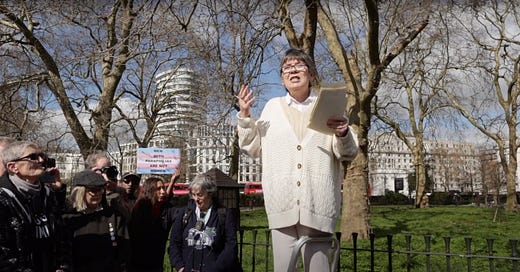Women won't be silenced
Scenes of women being threatened for talking about gender ideology have become commonplace. This has to change.
In almost all areas of politics, the idea of hearing women’s voices is celebrated. Men are encouraged to take a backseat in boardroom meetings, to let women’s voices be heard. Politicians wear ‘I am a feminist’ t-shirts to celebrate how much they supposedly care about women’s rights. New laws are proposed to protect women’s ability to engage in public life, from making misogyny a hate crime to enforcing gender quotas in workplaces. And on a weekly basis, awareness is raised across media platforms about the need to hear more women in everything from STEM to social media, football to finance.
It seems women are encouraged to speak in all areas of life, except when they have something to say about gender ideology. Scenes of women being heckled, threatened, assaulted and left to fend for themselves, all for the crime of talking about sex-based rights, have become commonplace. Perhaps the most battered gender-critical activist is Kellie-Jay Keen (also known as Posie Parker), who was forced to flee a rally in New Zealand after being kettled, crushed and attacked by pro-trans activists. No irony was lost on the shrieking opponents of Keen, who were shutting down a ‘Let Women Speak’ event, opposed to the idea that it is women who should decide who is allowed to enter women-only spaces, and not transgender women or violent activists.
In any other area of life, women being physically threatened for voicing an opinion would be front-page news - for weeks on end. But when it comes to the wrong kind of women - the type that believe that simply calling yourself a woman doesn’t quite cut it - there is little sympathy. Despite the fact that women who go to Speakers’ Corner in Hyde Park to talk about gender-critical issues have routinely been attacked (including 60-year-old Maria MacLachlan who was knocked to the ground and kicked by trans activists in 2017), little is said in defence of women’s right to speak out. In fact, at an event one week ago, the police were filmed walking away from a group of women who were being harassed and encircled by protesters shouting things like ‘the only good TERF is a dead one’.
It is not an exaggeration to suggest that it is becoming impossible for women to talk about the issue of women-only spaces. It’s also becoming increasingly difficult for us to defend ourselves. Back in 2018, the radical feminist Linda Bellos, who had frequently been threatened with violence for attempting to talk about gender ideology, was taken to court by an activist for saying: ‘Having born two children I think I’m physiologically, and in many other senses, a female and a woman… but I play football and box, and if any one of those bastards comes near me I will take my glasses off and thump them’. An activist watching the event Bellos was speaking at remotely on a livestream accused her of causing ‘harassment, alarm or distress’ by ‘threatening or abusive words or behaviour’ under Section 5 of the Public Order Act. Bellos and fellow feminist Venice Allan were forced to go to court to defend themselves. When women take a stand and defend their right to live and speak freely, they are the ones who are framed as the villains.
In the last 10 years, women from all walks of life, from famous feminists like Julie Bindel to students like Lisa Keogh, have been sacked, threatened, penalised and slandered for daring to speak out in favour of sex-based rights. Being gender critical on campus isn’t allowed. Dr Laura Favaro has had her sociological research on the ‘gender wars’ cancelled by City University - even asking questions isn’t permitted. How did we get to this stage? Gender-critical views have become the new heresy, merely speaking about women-only changing rooms or toilets or prisons can have you labelled a bigot. And yet, this sensible, normal view of sex and biology is shared by the vast majority of the population, who don’t think it’s wrong for girls and boys to understand the differences between them, or believe that sex is something you can change with a few lines of legal jargon. Why have we allowed such a mad minority position to become weaponised into a means to keep women silent?
The battle we face to let women speak is no easy matter - gender ideology has become an accepted truth in institutions and governments across the world. Just yesterday, the German football association announced that it would allow ‘transgender and non-binary players’ to choose if they play in men's or women's teams. Fortunately, women aren’t silenced easily - we’re bloody minded like that. Our own Claire Fox went to Speakers’ Corner last weekend and spoke to crowds of women who are determined to keep raising hell.
The courage of Keen, who plans to return to New Zealand as well as hold rallies in Dublin and other places around the world, should inspire us all. #LetWomenSpeak events are taking place every Sunday in April, with a special gathering on 30 April which I will be speaking at. Here at the Academy of Ideas, we stand in solidarity with women fighting for freedom and truth. Join us.
We have held several discussions about gender, free speech and women’s freedom at our annual event, the Battle of Ideas festival.
Tickets are available for the 2023 festival on Saturday 28 and Sunday 29 October.
Check out our website www.battleofideas.org.uk or subscribe to our Podcast of Ideas for more information including past videos and audio including discussions like these:
5 SOLDIERS – The Body Is The Frontline
Dance choreographer Rosie Kay was forced to resign from her own dance company after being accused of transphobia. Refusing to go quietly, Kay is back with a new production company - K2CO - and a new show called 5 Soldiers - The Body Is The Frontline. Do go and enjoy the art, and show some solidarity, too.
5 SOLDIERS - The Body Is The Frontline, the award-winning dance production created by choreographer Rosie Kay and K2CO, returns to the UK stage across April and May 2023 opening at Norwich Theatre Playhouse (20-22 Apr) before heading to Blackpool Grand Theatre (12 May) and Theatre Royal Bath (14 May).
This latest version of 5 SOLDIERS, which uses dance to explore the stories of a group of combatants who become fractured by war, is a thrilling and humane portrait of army life telling the stories of three men and two women serving off and on the front line. Highlighting the preparation for war, the personality traits of the soldiers, the off-duty camaraderie, boredom, high-jinx and horseplay, as well as the deeply important and at times contradictory role of women in the Armed Forces.
With recent examples that have drawn international attention, such as the war in Ukraine, the first European war since the Balkans, and the aftermath of the evacuation of Afghanistan severely affecting women’s rights, a country’s use of the military as a tool of power is still highly relevant, political and, in some cases, controversial.
Sparked by a dance injury and her psychological response to it Rosie, renowned for her extensive and often immersive research when creating new work, asked the armed forces for help and was offered an opportunity to embed on manoeuvres with 4th Battalion The Rifles near Salisbury, as well as residencies at the military rehabilitation centre Headley Court and the Royal Centre for Defence Medicine. The result was 5 SOLDIERS.






The principle of equal rights for all genders is not a politically cheap ideology. It is a legally anchored matter of course. See particularly the Charter of the United Nations (1945), the Universal Declaration of Human Rights (1948) and the Civil and Social Covenant of the United Nations (1966). and many other national regulations as e.g. Art. 3 constutution FRG.